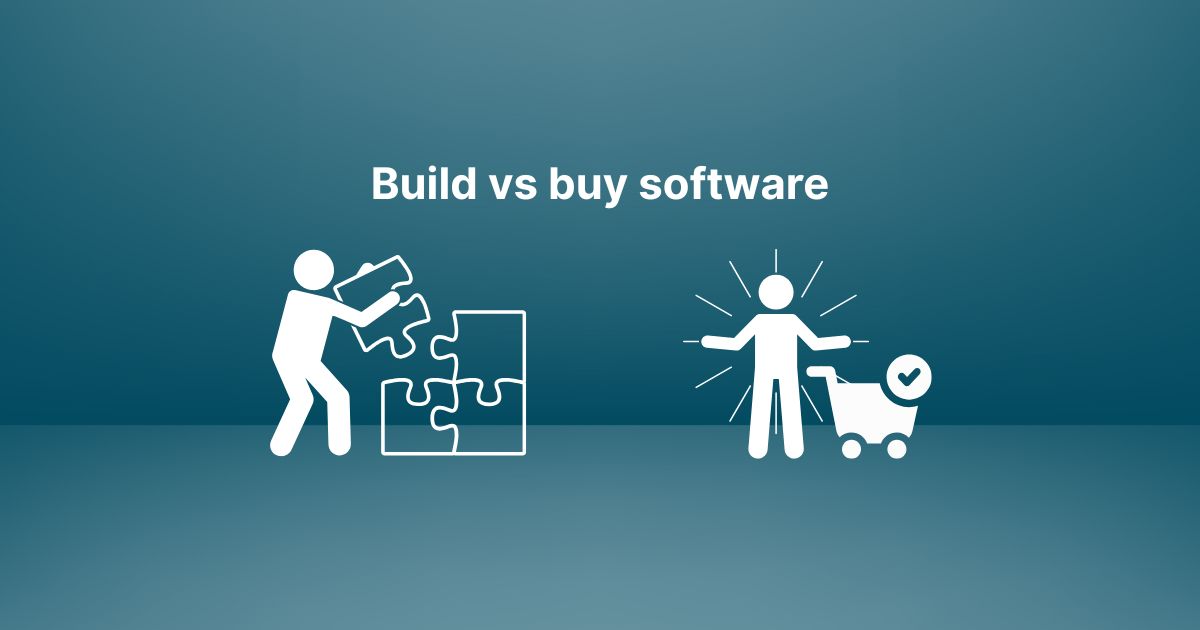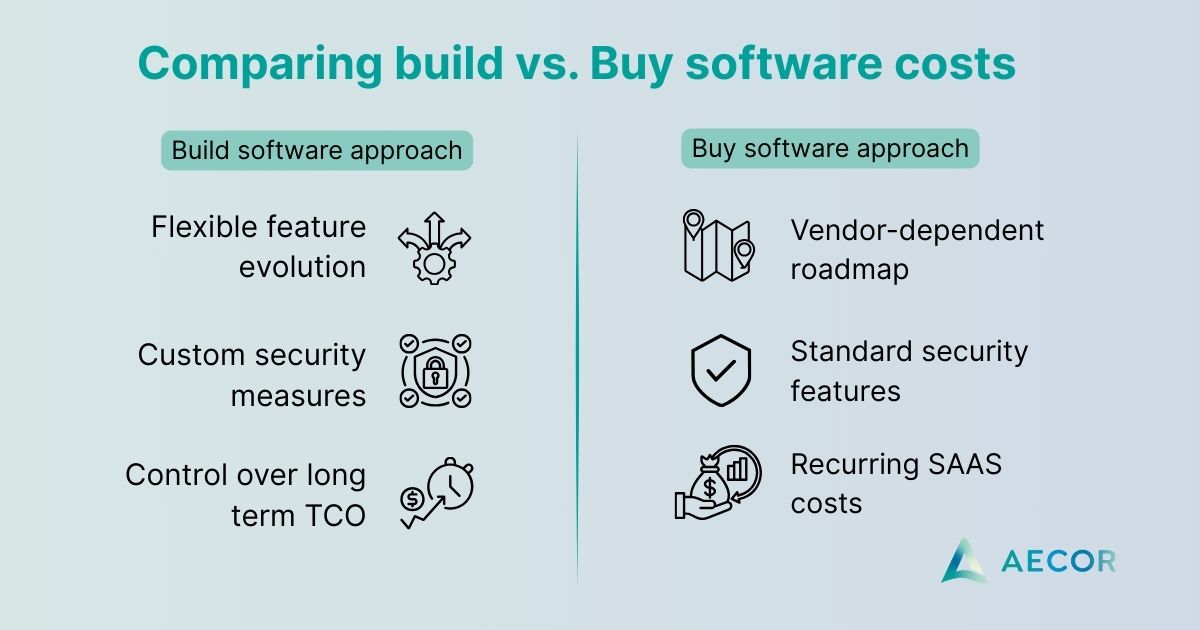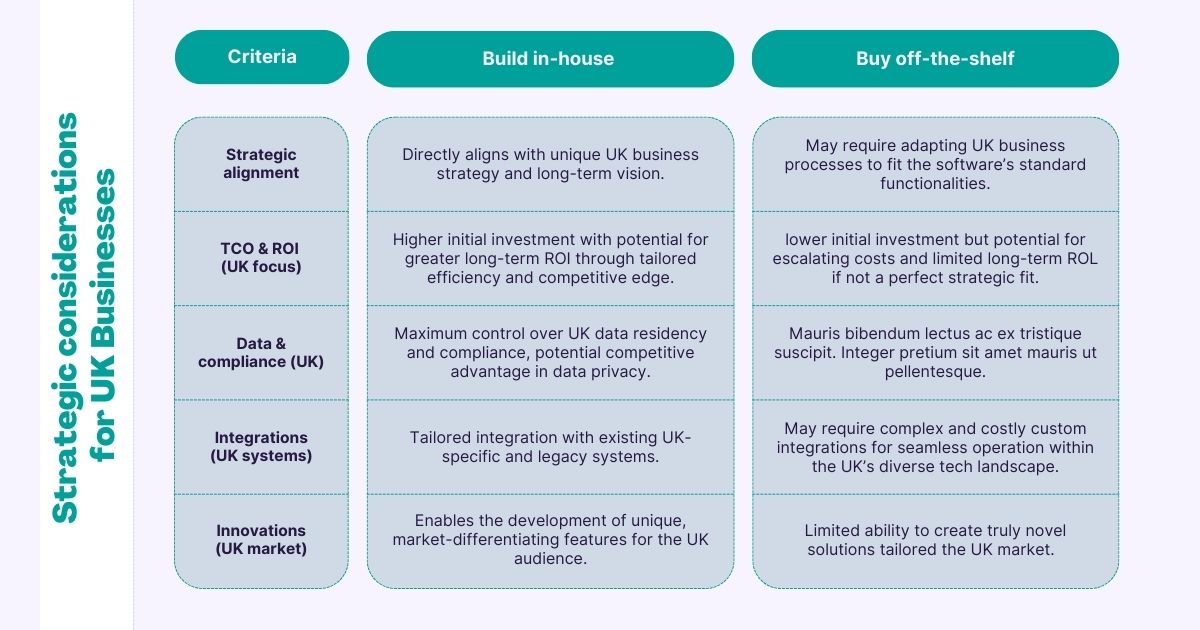Decoding the Build vs. Buy Dilemma for UK Digital Transformation: A 2025 Strategic Playbook

As tighter UK data sovereignty laws and compliance requirements kick in, the long-standing debate over custom-built software versus off-the-shelf solutions is hitting critical mass in boardrooms across Britain.
This choice isn’t just technical; it’s fundamentally strategic. The build vs. buy decision impacts everything from your ability to comply with UK regulatory frameworks like UK GDPR and the EU Cyber Resilience Act to how flexibly you can adapt to customer behaviour, legacy systems, and internal controls. And in an environment shaped by rapidly shifting compliance standards, modular architecture trends, and AI-driven automation, making the right decision is more complex than ever.
This guide unpacks the critical considerations influencing software investment decisions in the UK, grounded in technical expertise, regulatory alignment, and business architecture considerations. Whether you're modernising critical infrastructure, scaling a FinTech platform, or rethinking your SaaS footprint, the playbook below will help you make informed choices and prepare for emerging challenges.
Strategic Foundations for Build vs. Buy in 2025
Before narrowing in on implementation models, organisations must ground their approach in a realistic assessment of strategic requirements. The digital transformation strategies for UK SMEs outlined in our playbook are structured around five core considerations:
1. Time to Strategic Impact
Off-the-shelf SaaS provides rapid implementation and predictable timelines, a critical advantage in time-sensitive digital initiatives or regulatory deadline compliance.
However, custom development enables a tailored stack that aligns with the UK-specific workflows' operational model, internal logic, and data dependencies. Custom-built systems more easily incorporate unique UK regulatory requirements, like BSI standards or direct integration with HMRC, that many off-the-shelf products can't fully accommodate.
While custom development takes longer, it can deliver a differentiated value proposition that generic software simply can’t match, especially when considering custom vs. template websites: What UK businesses should consider.
Example: Consider a UK-based online retailer aiming to provide hyper-personalised shopping experiences based on regional preferences and buying patterns. A generic e-commerce platform might offer basic personalisation. Still, a custom-built recommendation engine leveraging UK-specific data (think weather, local events, popular regional products) can create a significant competitive edge.
2. Total Cost of Ownership (TCO)
While SaaS solutions might initially cost less, UK firms need to carefully weigh ongoing expenses, integration costs, and data residency factors over the long term. Key considerations include:
- Recurring subscription fees, often subject to vendor pricing changes
- Currency volatility when pricing is based on USD
- Integration costs with UK-specific systems, such as HMRC-compliant accounting tools
- Process limitations that result in costly workarounds
- Data residency surcharges or penalties when hosting is outside the UK
In contrast, custom-built systems require higher upfront capital investment but can provide flatter long-term cost curves. By aligning tightly with internal workflows, these systems reduce dependency on middleware, prevent shadow IT, and improve scalability planning under your terms.
Example:
A UK manufacturing company operating legacy machinery may need to meet data retention and reporting standards for domestic regulatory audits. Integrating a generic cloud ERP system might require ongoing middleware and license fees. A bespoke solution designed to connect directly to operational equipment can reduce data latency, cut middleware costs, and deliver regulatory reporting from a single system.
3. Why UK data compliance has become a strategic advantage
UK GDPR and data sovereignty: Post-Brexit regulations, alongside the impact of the EU Cyber Resilience Act on digital compliance, have amplified the importance of data sovereignty and adherence to UK GDPR. Off-the-shelf solutions, especially those hosted outside the UK, can introduce complexities regarding data storage, access, and compliance.
In March 2024, the UK's Information Commissioner's Office (ICO) issued updated guidance on calculating fines for data protection infringements, emphasising the importance of robust data governance and compliance frameworks for organisations operating within the UK.
The control of custom-built platforms: Bespoke development offers maximum control over data architecture, ensuring compliance with UK-specific regulations and allowing for the implementation of robust security measures tailored to your needs. This isn't just about avoiding penalties; it's about building trust with UK customers.
Example: Financial technology (FinTech) firms in the UK operate under stringent FCA regulations. A custom-built platform allows for the granular control over data access and audit trails necessary to meet these specific requirements, something a generic SaaS tool might struggle to guarantee.
4. A strategic comparison framework: Build vs buy for UK businesses
To further clarify the strategic trade-offs for UK businesses, consider this side-by-side comparison:
5. Hybrid approaches: The best of both worlds for UK organisations
Many UK organisations now recognise that the optimal digital transformation strategy isn't always a pure "build" or "buy" decision. Increasingly, UK businesses find success with hybrid models—combining SaaS efficiency with custom-built differentiation. This allows businesses to leverage the speed and cost-effectiveness of SaaS for certain needs while retaining the control and differentiation that bespoke development offers for core functionalities. Explore the potential of these models for your UK digital transformation:
Low-Code Platforms – Used for internal process automation and PoC development. Enables business units to prototype rapidly while central IT governs security and data access. Ideal for logistics, retail, and back-office transformation. Example: A UK-based retail chain rapidly develops store-level reporting tools with low-code forms connected to their central inventory database.
Modular SaaS + Custom Extensions – Foundational tools (CRM, HR) are retained as SaaS, while differentiating functionality (pricing engines, recommendations, KYC tools) is built in-house. See our post on Progressive Web Apps for custom integration examples.Example: A FinTech firm builds a custom onboarding KYC module to plug into a global SaaS CRM, ensuring FCA compliance and custom workflows.
MVP to Scale – Core logic is built as an MVP, validated with market and compliance testing, then expanded using selected SaaS connectors or headless microservices.Example: A UK public-sector agency prototypes a citizen portal with local hosting and access control, before scaling it with integration to NHS records.
6. UK trends shaping software strategy in 2025
The UK's unique technological and regulatory landscape is further shaping software strategy, presenting both opportunities and challenges for businesses. Keep these key trends in mind as you plan for 2025:
AI-driven development: In early 2025, UK firms are increasingly using AI for tasks traditionally handled by software developers, responding to a worsening tech talent shortage highlighted by TechUK’s recent industry report. A clear example is the rise of AI in UK e-commerce, where smart tools drive efficiency and personalisation. However, a clear strategic vision and strong governance remain crucial to ensure that AI is applied effectively and ethically within the UK context, aligning with data privacy regulations and business objectives. UK companies are exploring AI for code generation, intelligent testing, and predictive analytics within their software development lifecycle.
TechUK's 2024 report emphasised the transformative impact of AI across sectors, noting that businesses leveraging AI technologies are better positioned to meet evolving customer demands and regulatory requirements.
Composable architecture: This architectural approach focuses on building software applications from a collection of independent, reusable business capabilities packaged as APIs. This allows UK firms to become more agile and adaptable, integrating and swapping out components flexibly as business needs evolve and new technologies emerge. For example, a UK retailer might build its e-commerce platform using a composable architecture, integrating separate services for product catalogue management, payment processing, and shipping, allowing it to easily switch providers or add new functionalities.
The UK government's Digital Development Strategy 2024 to 2030 advocates for modular and flexible digital infrastructures, aligning with the principles of composable architecture to enhance service delivery and innovation.
Data sovereignty & vendor scrutiny: Post-Brexit regulations have significantly heightened the importance of data sovereignty and vendor scrutiny for UK organisations. Businesses are increasingly prioritising software solutions where data is stored and processed within the UK, and they are conducting more rigorous due diligence on vendors' data handling practices, security measures, and compliance with UK-specific regulations like UK GDPR. This trend is influencing build vs. buy decisions, with some UK companies opting for custom builds to ensure maximum control over their data and avoid reliance on international vendors with potentially different compliance standards.
In September 2024, the Financial Conduct Authority (FCA) consulted on new safeguarding rules for payments and e-money firms, underscoring the necessity for firms to have stringent data protection and vendor management practices to safeguard customer funds effectively.
Making informed software choices for UK success in 2025
In 2025, the build vs. buy decision is no longer a simple either/or question, it is a strategic spectrum. The right approach for your organisation depends on specific business objectives, regulatory requirements, and the level of customisation needed to deliver a real competitive advantage within the UK market.
Aecor Digital provides guidance to UK organisations, starting with a detailed assessment of operational and compliance needs, helping businesses determine precisely where custom builds make sense and where SaaS solutions offer real benefits.
Considering your next digital move?
Talk to our team to discuss how you can practically address compliance, cost, and competitive challenges in your technology strategy.
What our clients say















